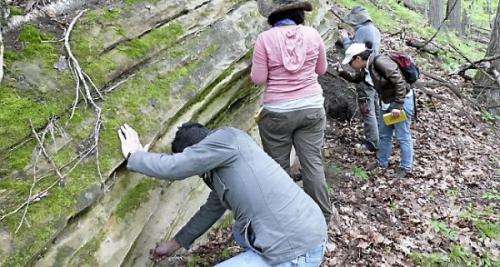Rare mineral found in a Wisconsin crater

Scientists have discovered one of the rarest minerals on Earth in a Wisconsin impact crater.
Aaron Cavosie of the University of Puerto Rico, and member of the NASA Astrobiology Institute Team at the University of Wisconsin, brought students to an impact site in Rock Elm, Wisconsin to collect samples. In those samples, Cavosie and colleagues discovered the mineral reidite, making Rock Elm the fourth site on Earth where the mineral has been found in nature.
Reidite is created at high pressures and was first identified in the laboratory in the 1960s. The conditions in which reidite forms have been well-constrained by experiments in the lab but, prior to Rock Elm, it was only found naturally in the Chesapeake Bay Impact Structure (Virginia), the Ries Crater (Germany), and the Xiuyan Crater (China).
The Rock Elm structure is 6.5 kilometers in diameter and was formed during the Middle Ordovician. This means that the reidite found at Rock Elm is at least 450 million years old, making it the oldest preserved reidite yet discovered.
Another important aspect of the research is that the reidite was found in sandstone – the first time the mineral was spotted in this type of rock. There are many other impact structures that have been formed in sandstone, and its possible that a re-examination of these sites could reveal more reidite.
"I get the sense that, because reidite had never been found in this kind of rock, if something's never found there, your not going to go look for it purposefully," said Cavosie in an interview with Wisconsin Public Radio. "Now that we've identified this recorder of even far more extreme impact conditions than what was known previously at Rock Elm, that tool can be applied to many, many other localities to try to recreate the impact conditions and better understand the effects on the surface environments of some of these impacts."
Wisconsin Public Radio produced an interview with Aaron Cavosie and Bill Cordua of UW-River Falls, who discovered the Rock Elm disturbance. To listen to the show, visit: www.wpr.org/listen/682916 - See more at: www.astrobio.net/news-brief/ra … sthash.Mpp66Tjz.dpuf
More information: The initial findings were presented at the 2014 GSA Annual Meeting in Vancouver: gsa.confex.com/gsa/2014AM/fina … /abstract_244685.htm
Source: Astrobio.net
This story is republished courtesy of NASA's Astrobiology Magazine. Explore the Earth and beyond at www.astrobio.net .




















